Are you a dyke, deviant, or general delight? Widely tolerated artist, writer, or photographer? Have a queer business venture you'd like to advertise, or a pressing problem you need our team of expert nonbinary butches to urgently weigh in on? Submit to our magazine today!
Don't wanna be here? Send us removal request.
Note
What article would you recommend to someone just getting into queer history?
It would really depend on the person and what they are looking for in terms of queer history, but how about we do a choose-your-own-adventure type answer!
Are you looking for a look at how we got to where we are today in terms of queer history?
Read: Magnus Hirschfeld or Maryam Khatoon Molkara
Are you looking to find comfort in the fact that queerness has existed throughout history?
Read: Khnumhotep and Niankhkhnum or Sir Ewan Forbes
Are you looking to have some of your preconceived notions about queer history to be challenged?
Read: The Golden Orchid Society or Rotimi Fani-Kayode
Does queer history intimidate you because you are afraid of it being a list of tragedies?
Read: The Ladies of Llangollen or Jackie Shane
Do you want to learn about the intersection of queer and disability history?
Read: Lou Sullivan or Victoria Arellano
Do you want queerness that resonates with lesser-known/discussed identities?
Read: Kristina King of Sweden or Zinaida Gippius
Are you looking for more information about names you already recognize?
Read: Sappho or Langston Hughes
Are you looking to be pulled into a rabbit hole of queer history?
Read: Edward Carpenter or Xulhaz Mannan
Are you looking for someone within your region?
Read: Making Queer History by country
Just searching for an odd little slice of queer history to wet your appetite?
Read: Elmyr de Hory or Salim Halali
Just want to know something new?
Read: Bajazid Doda or Geoffrey Bawa
Just looking for a story to grip you emotionally?
Read: Emmeline Freda Du Faur or Zdeněk Koubek
I hope you find something in this list that helps!
3K notes
·
View notes
Text
Open Call For Submissions

LESBIAN AND DYKE MAGAZINE
Inspired to reinvent the lesbian zines, magazines, and newsletters of the 80s, Left Hand Studios presents our own magazine for queer femmes, butches, and our brethren who connect to the lesbian community in other ways. One part art and literary magazine, one part community news and content.
Judas Kissed With Tongue is a magazine for dykes, deviants, and general delights. While it is a 'lesbian magazine, we publish works of all kinds from lesbians, bi, pan, ace, and aro women, drag kings and queens, trans women and men, and people identifying as any flavor of genderqueer—basically, anyone who has had a personal experience with femininity and queerness, however enthusiastic or unwilling. As long as it's queer and in some way relates to dyke experiences, lives, or thoughts, you're in the right place.
Submissions for art, writing, articles, advice questions, and more are open here or on our blog under 'submit'! Find our first issue available free/PWYW as a PDF or print on our ko-fi.
We accept submissions of art, poetry, short stories, photographs, and essays, but what else?
Advice questions for our DEAR DYKES column
Community letters
Missed connections
Op eds
Advertisements for wlw owned businesses
Book reviews
Recipes
More!
Subscribe to our tumblr for updates, with a newsletter coming soon containing news and sneak-peaks of our issues.
Submission deadline for our Fall 2023 issue is October 31st. It's coming up fast, so submit now!
Please share our call around for anyone who might want to submit! Questions? Just send us an ask.
#queer publications#queer magazine#dyke team talks#indie publishing#queer zine#dykes of tumblr#magazine#zine#litmag#art and literary magazine#litmagazine#queer community#lesbian community#lesbian#lesbians of tumblr#lesbian magazine#lesbian pride#lesbian art#lesbian writing#queer writing#publication#publishing#print publication#writers of tumblr#artists of tumblr#art#art submissions#submission#zine submissions#submission opportunities
37 notes
·
View notes
Text
Open Call For Submissions

LESBIAN AND DYKE MAGAZINE
Inspired by the wonderful lesbian zines, magazines, and newsletters of the 80s, Left Hand Studios presents our own magazine for queer femmes, butches, and our brethren who connect to the lesbian community in other ways in the modern era. One part art and literary magazine, one part community news and content.
Judas Kissed With Tongue is a magazine for dykes, deviants, and general delights. We publish works of all kinds from lesbians, bi, pan, ace, and aro women, drag kings and queens, trans women and men, and people identifying as any flavor of genderqueer—basically, anyone who has had a personal experience with femininity and queerness, however enthusiastic or unwilling. As long as it's queer and in some way relates to dyke experiences, lives, or thoughts, you're in the right place.
Submissions for art, writing, articles, advice questions, and more are open. Find our first issue available free/PWYW as a PDF or print on our ko-fi.
We accept submissions of art, poetry, short stories, photographs, and essays, but what else?
Advice questions for our DEAR DYKES column
Community letters
Missed connections
Op eds
Advertisements for wlw owned businesses
Book reviews
Recipes
More!
Subscribe to our tumblr for updates, with a newsletter coming soon containing news and sneak-peaks of our issues.
Submission deadline for our Fall 2023 issue is October 31st.
Please share our call around for anyone who might want to submit! Questions? Just send us an ask.
#art zine#dyke#magazine#publishing#queercrip#zine#zine promo#queer zine#lesbian zine#lesbian magazine#dykes of tumblr#lesbians of tumblr#butches of tumblr#queer magazine#queer publications#lgbt zine#lesbian#wlw#sapphic#lesbian pride#lgbtq#lgbtqia#lgbt pride#lgbtq community#queer#queer pride#queer community#writing#art#artists of tumblr
157 notes
·
View notes
Text
hey, everyone! i've been working on curating some new stuff for my gender/queer studies folder! some of the new additions include every digitized issue of ftm international along with some other ftm newsletters that i thought were interesting. if you want to check them out, they're the folders that are colored red in the periodicals/magazines folder!
i am thinking about having a spreadsheet with all of the current books, magazines, zines, and periodicals that are in the folder and also adding a request form that people can fill out for me to add new books/topics. i truly want this to be a resource for everyone so i am definitely open to ideas/requests. until i get the spreadsheet/form set up, feel free to shoot me a dm or ask with any ideas or requests for my resource folder.
260 notes
·
View notes
Text
While understandable, I think that the visceral panic and hostility towards “contradictory” identities within the queer community is incredibly frustrating at best and damaging at worst.
The desperation so many queer people have for an objective rulebook of what labels mean and who can use them is just tragic assimilationist fear of deviancy, and an insult to the magnificence of rulebreaking. Historically queer identity has always been inherently subversive and challenging to the hegemonic ideals of cisheteronormative culture. Abject rigid categorisation of an experience that is to its very core antithetical to the standards of society™ seems like it's kind of missing the point.
I think that many younger queers find being faced with the fact that their labels are nothing more than a constructed performance to be scary and confronting, and understandably so. In a world where deviation from the commonly accepted norm can get you killed, having an easy way to explain who you are that you see as the one objective truth without flaw can be comforting.
But personal invalidation or discomfort is not a reason for a marginalised person to enact the same bigotry they face onto others in an attempt to deflect it. Language is ever evolving, our feelings of queerness came far before we came up with terms like “gay” “lesbian” and “transgender”. The shifting of how we understand these terms and apply them to ourselves over time is inevitable, and I consider the fluidity of these categories not invalidating, but a beautiful thing. There is no “solving” the question of which identities are acceptable and which aren't, anyone who is attempting to do so is fighting a losing battle. Queerness is not something that will ever be able to be pinned down by a checklist of validity. Queerness is more than just “LGBT”.
it is eternal and ethereal.
220 notes
·
View notes
Text
Butch/Femme history and culture introduction (written by a femme lesbian, deeply in love with being so)
💖Ideal for people immersing themselves in lesbian culture for the first time
🤍This post will contain brief summarising information about butch/femme culture and history as well as an introductory resource list for continuing your learning journey.
🧡It is by no means exhaustive and is intended as a very basic and simplified introduction that people can and should easily build on. Please try to keep this intention in mind before telling me i have neglected something!
⚠️ Disclaimer - this post is admittedly very centred on butch/femme history of the US and western culture in the 1900s. If there is a different culture or time that you’d be interested to learn more about, I would be overjoyed to research it so please let me know! Lesbianism has existed everywhere in every time and the cultural variation of this is beautiful and SO important. I do not want to neglect that but cannot fit it all in this brief introduction post.
“Whether reclaiming femininity from the male gaze or rejecting feminine gender norms by embracing butch, the subculture is intrinsically radical: it empowers lesbians to renounce patriarchal standards of beauty.” - Megan Christopher
What is butch/femme?
butch/femme is a lesbian subculture with a deep and rich history and culture. It goes far beyond masculine and feminine aesthetics and informs lesbian identity and dynamics. Butch/femme culture is a crucial part of LGBTQ+ history and culture as a whole.
It has existed for a very long time but it is very important to know that not all lesbians are butch/femme. In fact, most lesbians will not identify with either label and that is completely okay! You will see some lesbians describe themselves as butch4butch or femme4femme.
Traditionally, there is nothing in between butch/femme and to suggest otherwise negates the rich significance of the identities. Some people suggest it is a spectrum with “futch” in the middle. This is however not the case and the significance of this will become clear as we delve further into the importance of butch/femme identities to queer culture and history. Crucially too, straight women cannot be butch/femme
Aren’t butch/femme just replicating traditional heterosexual gender roles?
Absolutely not! In fact, they outwardly challenge them.
Gender and sex are constructs. A lot of lesbians find that butch/femme are gender identities in of themselves (myself included)
Instead, butch/femme are identities that encapsulate a particular “performance” of gender. The attributes of these may seem “masculine” or “feminine” but this is only because of the strict gender binary our society ascribes to gender performance.
Judith Butler, in their book Gender Trouble, notes that a lot of lesbians in general have a complex relationship to gender. This is because our binary perception of womanhood is constructed on the basis that “male” is default and “female” is the only sexed other. Because lesbianism is the only identity that totally de-centres men, a lot of lesbians (regardless of being butch, femme or neither) will not feel like they are conventionally “women”.
A lot of the time, butch/femme roles were and still are a source of safety and solace
Butch
Butch refers to masculinity in any number of ways
Butches typically and historically face high levels of discrimination and harassment for their gender non conformity.
A very important butch text is Stone Butch Blues, written by Leslie Feinberg
In the book, Feinberg discusses the importance of working-class identities to butchness.
Some butches are transmasculine. This doesn’t make them less of a lesbian, as long as they have ties to butchness and lesbianism.
Stone butches are lesbians who do not like to be touched (or “receive”) during sex
Femme
Femmes are lesbians who present more “femininely”.
Femmes do not necessarily conform to society’s perception of womanhood. Many will have complex relationships to gender identity or will present as hyper-feminine.
Hyper-femininity is an exaggerated performance of womanhood where aspects of dress, character and/or mannerisms of femininity may be heightened.
This is why a lot of the time lesbians can still “clock” (or recognise) femmes as being gay. Straight women tend to feel put off by the level of femininity common with hyper-feminine femmes.
History
In western culture, butch/femme culture existed underground or secret up until the mid 20th century. We can assume however that butch/femme dynamics have existed for a long time.
In the early 1900s, butch/femme dynamics were confined to underground gay bars.
In this case, femmes were often considered in a position of privilege as they were “straight passing” and could only be recognisably lesbian when accompanied by a butch.
Femmes will often assert sexuality through their femininity.
In the 1940s, butch/femme dynamics were extremely important and a thriving part of lesbian culture.
Women were allowed to enter bars without men.
In the US, butches would have to dress femininely in order to hold employment and avoid harassment and assault based on their preferred gender non-conformity.
Butches dressed in a way that was accepted by society, while still presenting as more masculine than the norm. Alix Genter writes that "butches wore long, pleated skirts with their man-tailored shirts, sometimes with a vest or coat on top"
In the 1950s, many butches refused to live these double lives. Their full-time masculine presentation made it difficult for them to work so they were often employed in factories or as taxi drivers. (hence the importance of working-class solidarity with butches)
Increased lesbian visibility and a strong anti-gay political stance at the time of McCarthyism led to increased attacks on queer women and resulted in a particularly defiant gay bar culture.
Butches are therefore extremely important in our fight for LGBTQ+ rights. It was butches and trans women who were known for fighting back for our rights and visibility.
In the 1970s, particular sentiments of lesbian separatist feminism declared masculinity and butchness was harmful to women. This led to the popularisation of more androgynous fashion amongst lesbians including boots, jeans and flannels. This movement weakened butch identifiers and is known for alienating lesbians of colour and working class lesbians.
Lesbian separatism is essentially the idea that lesbians should exist separate to men and heterosexual women. That is why some theorists believed performances of masculinity were harmful (while others did not believe this and it is obviously not true)
Introductory reading list (online articles that are short and accessible)
how butch/femme subcultures allow gay women to thrive by Megan Christopher for VICE: https://www.vice.com/en/article/wjwzqx/how-butch-femme-subcultures-allow-gay-women-to-thrive
A good introduction to the radical history and importance of butch/femme identities.
The Lesbians That Founded The Gay Village And The Mafia Alliance They Made For Protection by Diana Robertson: https://www.huffpost.com/entry/the-lesbians-that-founded-the-gay-village-and-the-mafia_b_5941d7a1e4b0d99b4c921126
Really helpful history!
No Matter What’s Gendertrending, the Butch is Here To Stay by Jack Halberstam
https://web.archive.org/web/20180907141513/https://www.afterellen.com/tv/443117-no-matter-whats-gendertrending-the-butch-is-here-to-stay
I don’t like the suggestion of the title but the article itself has good information. Jack Halberstam is an important queer theorist. I also recommend his writings on queer failure. This article has some generally good direction about butchness, especially in modern media. “Butch is always a misnomer; masculine but not male, female but not feminine, the term serves as a placeholder for the unassimilable, for that which remains indefinable or unspeakable within the many identifications that we make and that we claim.”
Key books for a deeper understanding (and their pros and cons)
The Persistent Desire: A Femme–Butch Reader by Joan Nestle
Gender Trouble by Judith Butler (one of my favourite books of all time. Really difficult to get through but very worthwhile and completely changed the way I understand sex and gender)
Stone Butch Blues by Leslie Feinberg (an incredibly important lesbian text. Can be very difficult to get through, especially emotionally. Please make sure to check triggers before reading)
Dagger: On Butch Women by Lily Burana
503 notes
·
View notes
Text
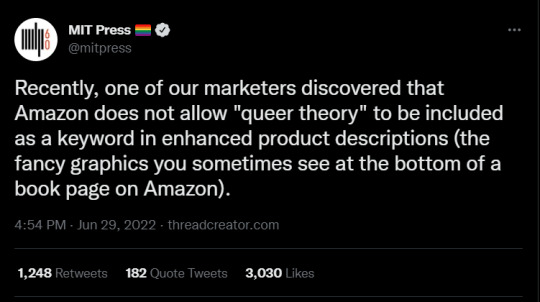



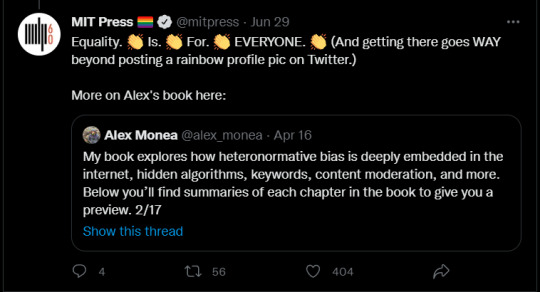
Deeply important. When purity-consciousness overwhelms a movement, it often ends up doing its enemies work for it. Direct link to thread below, above images screenshotted for posterity:
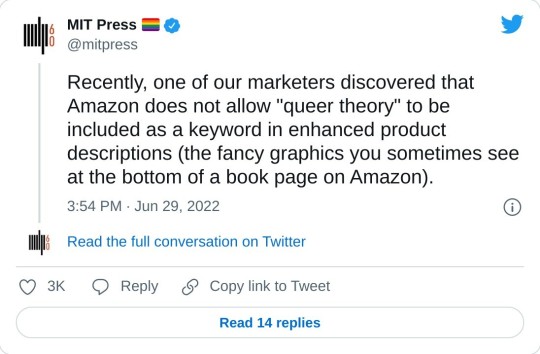
27K notes
·
View notes
Text
happy pride to all lesbians w/ comphet!!!! u are not less than as a lesbian and ur feelings are incredibly valid. the way u feel is not ever ur fault and shame+imposter syndrome as a lesbian can be very exhausting. allow urself to be celebratory and proud this month❤️❤️❤️
93 notes
·
View notes
Text

Please join me in celebrating the release of our first issue of Judas Kissed With Tongue, a lesbian publication by and for our community.
Get your copy here for free!

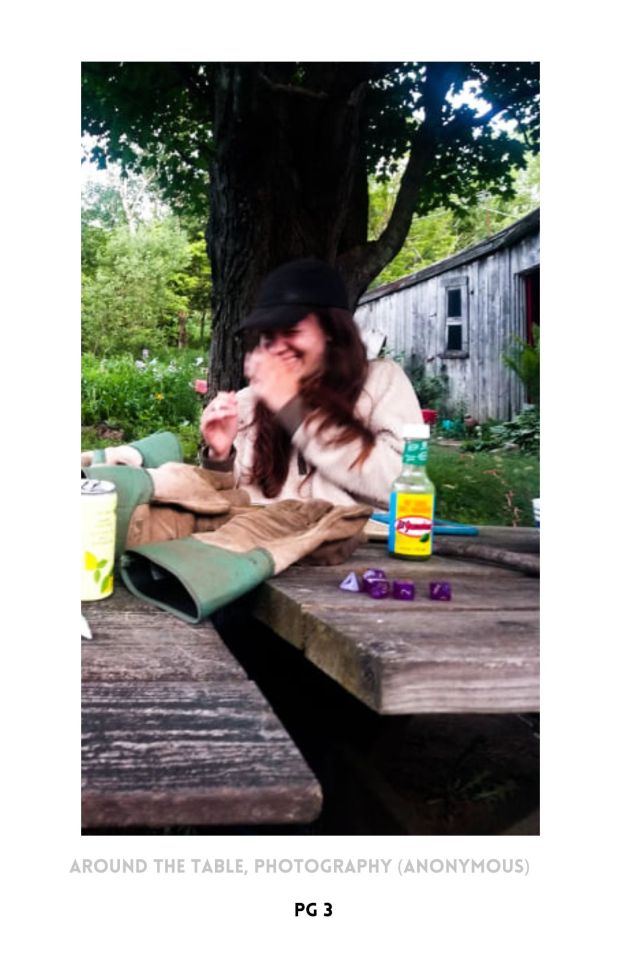

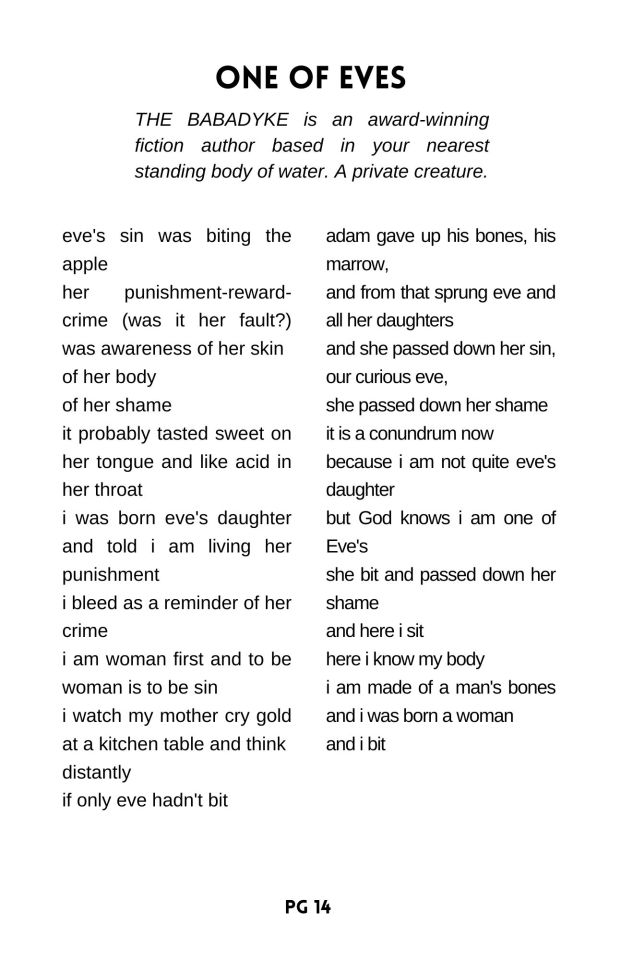
We are just getting started on our crazy journey to publication, and we are so grateful to the support of the community and our wonderful team.
Special thanks to our very first writers and artists for trusting us with your work while we are still in the infancy of our project:
Chuck Haugh Cedar Ecker Griffin K. Day
And of course to our team members who allowed us to feature their work:
M. Woode, @rose-caravan The Babadyke, @dogbiteyou Bard Rock, @flatbirder
Special special thanks to @flatbirder for the fantastic cover design!
Interested in having your work featured? Submit here before November 1st!
#queer publications#dyke team talks#queer magazine#indie publishing#queer zine#dykes of tumblr#magazine#zine#lesbian magazine#lesbian pride#lesbian art#lesbian#queer art#queer#dyke magazine#dyke#dykestuff#dyke news#lesbians of tumblr#lgbt#lgbt community#lesbian community#dyke community#butches of tumblr#butch#butch lesbian#butch positivity#lesbian positivity
73 notes
·
View notes
Text
Open Call For Submissions

LESBIAN AND DYKE MAGAZINE
Inspired by the wonderful lesbian zines, magazines, and newsletters of the 80s, Left Hand Studios presents our own magazine for queer femmes, butches, and our brethren who connect to the lesbian community in other ways in the modern era.
Judas Kissed With Tongue is a magazine for dykes, deviants, and general delights. We publish works of all kinds from lesbians, bi, pan, ace, and aro women, drag kings and queens, trans women and men, and people identifying as any flavor of genderqueer—basically, anyone who has had a personal experience with femininity and queerness, however enthusiastic or unwilling. As long as it's queer and in some way relates to dyke experiences, lives, or thoughts, you're in the right place.
Submissions for art, writing, articles, advice questions, and more are open. Find our first issue available August 31st through PDF or print on our ko-fi. Subscribe to our tumblr for updates, with a newsletter coming soon containing news and sneak-peaks of our issues.
Submission deadline for our Fall 2023 issue is October 31st.
Please share our call around for anyone who might want to submit! Questions? Just send us an ask.
#art zine#dyke#magazine#publishing#queercrip#zine#zine promo#queer zine#lesbian zine#lesbian magazine#dykes of tumblr#lesbians of tumblr#butches of tumblr#queer magazine#queer publications#lgbt zine#lesbian#wlw#sapphic#lesbian pride#lgbtq#lgbtqia#lgbt pride#lgbtq community#queer#queer pride#queer community
157 notes
·
View notes
Note
Happy to announce we will be releasing Judas Kissed With Tongue Issue 0 on Thursday August 31st!
hi, ive just found your zine and im interested to know if theres a planned publication date for the first issue yet, as looking through your blog i couldnt seem to find anything
Hi there!
We had planned for our first release to be the Spring issue, but things slowed down a bit due to work for our team and it's now coming at the end of August instead (because that's when we get printer access back haha). I can say happily that the first issue is fully put together and awaiting a few final edits from our lovely volunteer copy editors, and we are so excited to share it with everyone. We will let folks on here know when we have the exact date!
We are also taking submissions for our Fall issue from now until November.
6 notes
·
View notes
Text

waking after the surgery by Leila Chatti
397 notes
·
View notes
Text
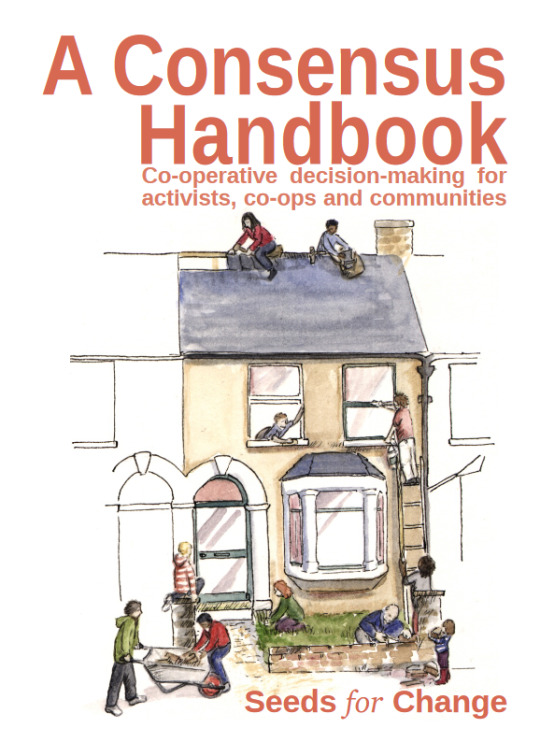
[the cover of A consensus handbook by Seeds for Change, featuring the title in Orange lettering followed by an color drawing of 11 people working on the maintenance of a house]
I'm going to share this as a separate post for those that missed the ask: A consensus handbook by Seeds for Change https://www.seedsforchange.org.uk/handbookweb.pdf is a free and very handy guide to how to take decisions as a group without leaders or hierarchies. I'm going to drop the chapters here to show off just how much useful stuff it has. If you work with consensus, there's almost certainly a problem in here that you recognize and wish you had some answers to!
1: Making decisions by consensus What’s wrong with the democracy we’ve got? - Why use consensus? How does consensus work? - The consensus process - Key skills and values for consensus 2: Facilitating consensus The role of meetings in group work - What is facilitation? - Facilitating a meeting – Making meetings accessible - Taking minutes 3: Facilitating consensus in large groups Meeting the conditions for consensus in large groups - Processes for large groups 4: Facilitating consensus in virtual meetings Why have virtual meetings? - The tools for the job - Challenges of facilitating virtual meetings - A consensus process for virtual meetings 5: Quick consensus decision making Preparing for quick consensus - How it works 6: Facilitation techniques and activities Starting the meeting - Regulating the flow of the meeting - Encouraging involvement - Techniques for problem solving and tackling difficult issues - Prioritisation techniques - Activities for re-energising - Evaluating meetings 7: Troubleshooting in your meetings Our meetings take a long time - Time pressure - Our meetings lack focus - Our group is large and we don’t enjoy meetings - We’re stuck and can’t reach a decision - Too many ideas - ‘Steamroller’ proposals - How can we deal with disruptive behaviour? - What to do when someone blocks - Our group is biased towards the status quo 8: Bridging the gap between theory and practice Conflict and consensus - The life cycle of a conflict - Ways of dealing with conflict - Techniques for inviting collaboration Power dynamics - Step one: What are our feelings about power dynamics? - Step two: Diagnosis – what is actually going on - in your group? - Step three: Where do your power imbalances come from? - Step four: Work out some ways to change your power dynamics Other common issues - External pressures - Open groups with changing membership - What if you’re the only person who wants the group to change? 9: Consensus in wider society So how might it work? - Challenges, questions and tensions - How do we get there? - A final thought
#findings not from our press 😳#consensus#cooperative living#communal living#don't know much about this but seems interesting!
2K notes
·
View notes
Text
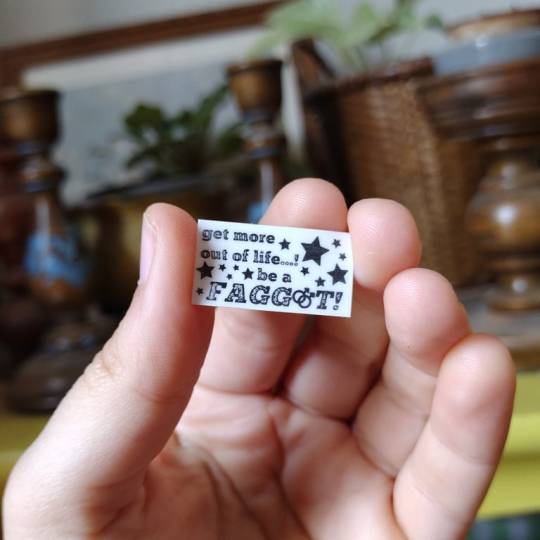
these minis are BACK IN STOCK!! full size also restocked
706 notes
·
View notes
Text
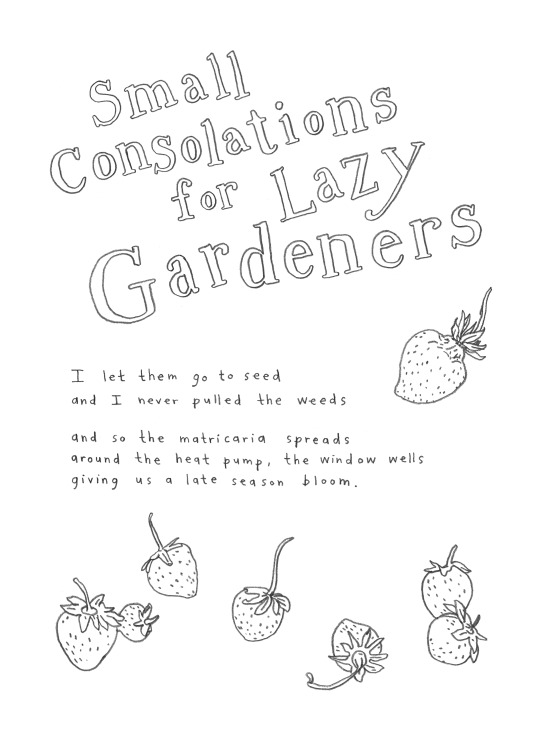
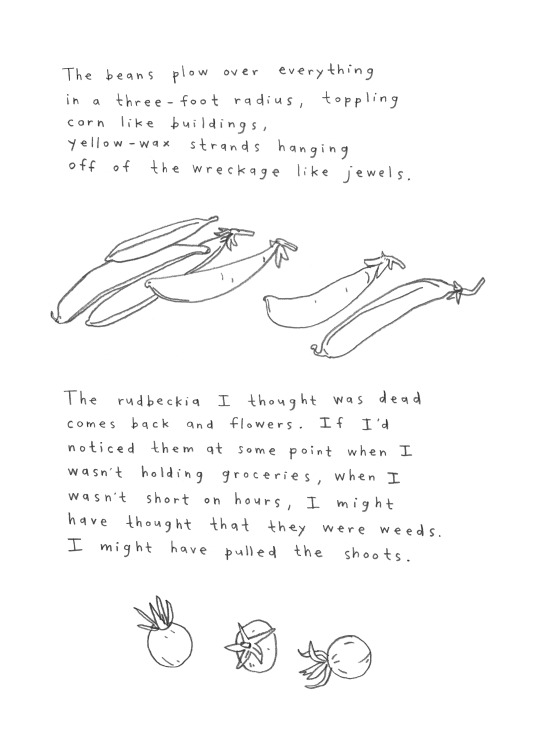
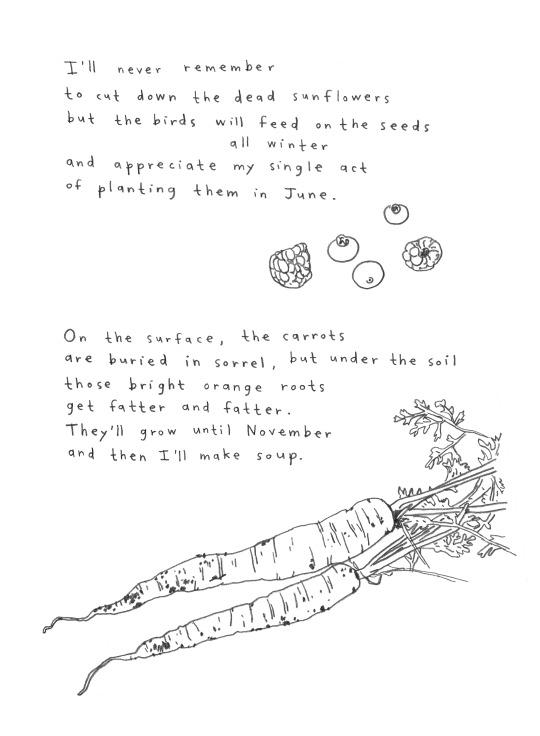
SMALL CONSOLATIONS FOR LAZY GARDENERS
A little poem about imperfect efforts, from my zine Small Consolations.
(Made with support from The Canada Council for the Arts and my subscribers on Patreon! Thank you!)
355 notes
·
View notes
Text


Sammy and Molly, illustrated for the first issue of The Garden People, a collaborative zine about gardens and the people who grow them 🌷 You can find the zine in my shop.
171 notes
·
View notes




